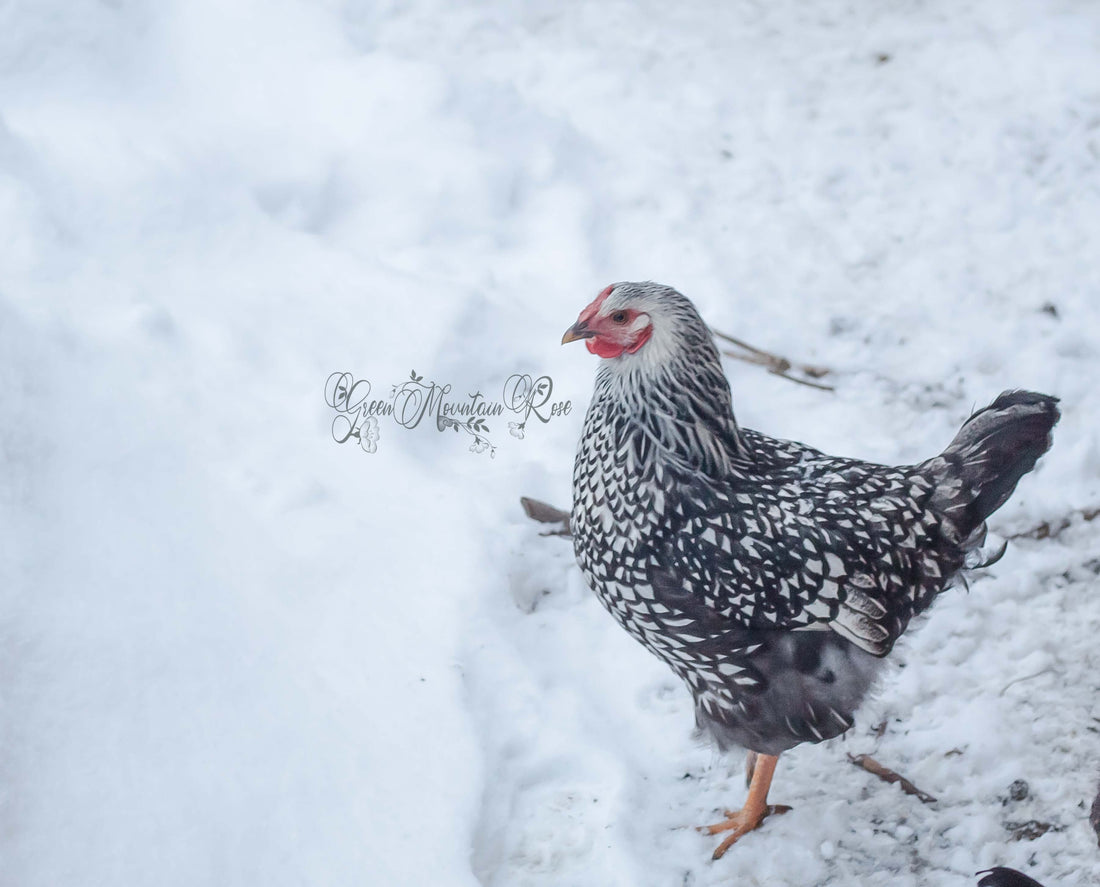
Keeping Chickens in the Winter: A Complete Guide.
RoniLynn ShroutShare
Keeping Chickens in the Winter: A Complete Guide
Raising chickens in the winter requires some additional care and preparation to ensure they stay safe, warm, and healthy during the colder months. Many chicken keepers wonder whether they should use artificial heat, how to protect their flock from predators, and what to feed their birds when natural foraging is no longer an option. This guide will answer these questions and more, giving you all the information you need to keep your chickens happy and productive throughout the winter.
Best Cold-Hardy Chicken Breeds
Some chicken breeds are better suited for cold climates due to their larger body size, smaller combs, and dense feathering. If you live in an area with harsh winters, consider raising these hardy breeds:
- Rhode Island Reds: Known for their resilience and consistent egg production in colder months.
- Orpingtons: Large, fluffy birds that tolerate cold well and have a calm temperament.
- Australorps: A hardy breed that continues laying well during winter.
- Plymouth Rocks: Dual-purpose birds with thick feathers and strong adaptability.
- Wyandottes: Their rose combs make them less susceptible to frostbite.
- Brahmas: Large birds with feathered feet that help keep them warm in snowy conditions.
- New Hampshire Reds: Similar to Rhode Island Reds but slightly larger and cold-resistant.
- Delawares: Hardy and good egg layers even in winter.

Keeping Chickens Safe from Predators
Winter can make chickens more vulnerable to predators as food sources become scarce for wildlife. Here are some key strategies to keep your flock safe:
- Secure the Coop: Make sure all holes, cracks, and weak spots in the coop are sealed to prevent entry by raccoons, foxes, weasels, and other predators.
- Use Hardware Cloth: Chicken wire is not strong enough to keep out determined predators. Instead, use hardware cloth with small openings to reinforce the coop and run.
- Lock Up at Night: Always lock your chickens in the coop at dusk and ensure doors and windows are secure.
- Motion-Activated Lights and Alarms: Installing motion-activated lights or alarms can deter nocturnal predators like coyotes and owls.
- Bury Fencing: Predators such as foxes can dig under fences. Bury hardware cloth at least 12 inches deep around the perimeter of the run.

Keeping Chickens Warm: To Heat or Not to Heat?
Chickens are remarkably cold-hardy and can tolerate low temperatures as long as they are dry and out of the wind. Adding artificial heat is generally discouraged due to the risk of fire and making chickens dependent on higher temperatures.
How to Keep Chickens Warm Without Heat
- Proper Ventilation: While it may seem counterintuitive, ventilation is key to preventing moisture buildup, which can lead to frostbite. Ensure vents are placed above the roosting area to allow warm air to escape.
- Deep Litter Method: Layering bedding (straw, pine shavings, or hay) several inches deep allows it to decompose slowly, generating natural warmth.
- Draft-Free, Insulated Coop: While insulation helps retain warmth, avoid sealing the coop too tightly as it can lead to humidity buildup.
- Provide a Roosting Bar: Chickens will fluff up and tuck their feet under their bodies while roosting, helping them conserve heat.

Artificial Light: Should You Use It?
During the winter, daylight hours decrease, which can lead to a decline in egg production. Some chicken keepers opt to use artificial lighting to maintain egg-laying, but this comes with both benefits and drawbacks.
Pros of Using Artificial Light:
- Keeps egg production steady throughout the winter.
- Can help maintain a more regular laying cycle.
Cons of Using Artificial Light:
- Can cause stress to the chickens if not implemented properly.
- May shorten the lifespan of the hens due to continuous laying.
- Risk of fire if using improper fixtures.
If you decide to use artificial lighting, use a low-wattage bulb (like LED) on a timer to mimic natural daylight, gradually increasing the hours rather than suddenly switching it on.
Winter Diet: What to Feed Chickens
Chickens require more energy to stay warm in the winter, so their diet should be adjusted accordingly.
- Higher Protein Feed: Feed a layer feed with at least 16% protein to maintain health and egg production.
- Scratch Grains: Corn and other grains can be given in the evening to help chickens generate internal heat overnight.
- Greens & Veggies: Since free-ranging is limited, supplement with leafy greens, squash, pumpkins, and other vegetables.
- Calcium & Grit: Ensure chickens have access to oyster shells for calcium and grit for digestion.

Cleaning the Coop in the Winter
Cleaning the coop in cold weather can be challenging, but maintaining a sanitary environment is crucial for preventing disease.
- Use the Deep Litter Method: Instead of frequent cleanouts, add fresh bedding on top of old bedding. The decomposition helps generate warmth.
- Spot Clean Regularly: Remove wet or soiled bedding as needed to prevent ammonia buildup.
- Keep Nesting Boxes Clean: Replace bedding frequently in nesting boxes to keep eggs clean and prevent freezing.
- Ensure Proper Ventilation: Even in winter, good airflow prevents moisture buildup, which can lead to respiratory issues.

Keeping Water from Freezing
One of the biggest challenges in winter chicken keeping is ensuring they have access to unfrozen water at all times.
Ways to Keep Water from Freezing:
- Heated Waterers: These can be purchased and will prevent freezing in subzero temperatures.
- DIY Heated Base: Place a metal waterer on a heated base, such as a cinder block with a light bulb inside.
- Frequent Water Changes: Bring fresh water multiple times a day if electricity is not an option.
- Use Rubber Bowls: Rubber water bowls are easier to break ice out of compared to plastic containers.
- Salt Water Bottle Hack: Placing a sealed bottle of saltwater in the water dish can help slow down freezing.

Do Chickens Still Lay Eggs in the Winter?
Egg production often slows down in winter due to decreased daylight hours. However, some chickens will continue laying, especially if they are young or from winter-hardy breeds.
To encourage laying in winter:
- Provide a balanced diet with enough protein and calcium.
- Ensure they have access to fresh water at all times.
- Reduce stress by keeping predators away and maintaining a clean, draft-free coop.
- Consider using artificial lighting to extend daylight hours (if desired).

Conclusion
Keeping chickens in the winter requires extra effort, but with the right preparation, your flock will thrive even in cold temperatures. Focus on predator-proofing, maintaining a dry and draft-free coop, providing a high-energy diet, keeping water from freezing, and deciding whether to supplement with artificial lighting. With these strategies in place, you can ensure that your chickens stay happy, healthy, and productive throughout the winter months.




